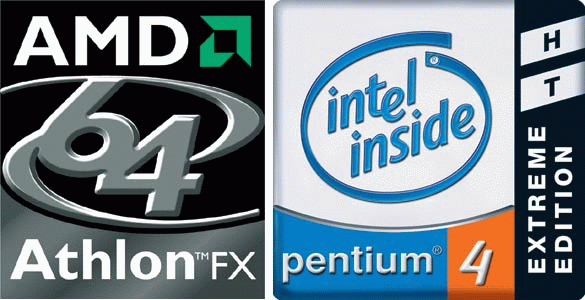Overclocking En Extremus: Athlon 64 FX 2.9 GHz, P4 EE 4.0 GHz
High Noon Below The Freezing Point
What is hot, fast and unaffordable for most THG readers? AMD's Athlon64 FX and Intel's Pentium 4 Extreme Edition. It is not as if these processors represent huge cash cows for the two CPU giants. But as most THG readers know, AMD's and Intel's latest represent the latest fodder in a war over who offers the best and fastest.
While the fastest Intel processor has always been as expensive as a large-screen TV, AMD, in comparison, sold its top models dirt cheap - that is, until it debuted its 64 Bit models. By launching the Athlon64 and the Athlon64 FX, the Santa Clara based chipmaker now offers processors that, Gigahertz for Gigahertz, are comparable to Intel's Pentium 4 in price.
There is, for example, the Athlon64's NX-Bit (no execute) feature, which helps to mark parts of the main memory as non-executable. As a result, malicious code that has been written to those memory areas due to provoked buffer overflows cannot be executed any longer. Users will be able to take advantage of the feature once Microsoft releases the Service Pack 2 for WindowsXP.
There is also the Athlon64's Cool and Quiet feature, which automatically reduces the Athlon64's clock rate when the processor runs idle. This function thus slashes power drastically, which is similar to Intel's Speedstep and AMD's PowerNow! for mobile processors. However, due to disappointing backing from motherboard-makers, this function is currently not worth more than your everyday pre-election promise by a politician. This is a shame, because when taken at a global level, the end result is a tremendous waste of energy. At the same time, Intel is in a similar mess with its Pentium 4 Prescott's SSE3 commands.
Last but not least there is the Athlon64's integrated memory controller, the performance of which seems to grow with every clock rate increase. In contrast, this component turns into a bottleneck much earlier when used with comparable Intel processor, since the memory controller does not accelerate with CPU clock speed gains.
Intel has been aware of this potential bottleneck for some time, which becomes more acute with its Xeon MP processor lines, where multiple processors share one memory path. In fact, that's the reason Xeon MP is available with up to 4 MB L3 cache. In the Pentium 4 Extreme Edition, only 2 MB are available.
The memory controller issue is why the Pentium 4 Extreme Edition can beat the Athlon64 FX in many areas with clock rates of 3.2 GHz and 3.4 GHz and in combination with HyperThreading.
Get Tom's Hardware's best news and in-depth reviews, straight to your inbox.
Thus lies the feature and clockspeed battle between the two processors Athlon64 FX 53 and the Pentium 4 Extreme Edition 3.4 GHz. Here, our overclocking tests indicate which of the two will come out on top.
Current page: High Noon Below The Freezing Point
Next Page A Historical Processor Overview
Patrick Schmid was the editor-in-chief for Tom's Hardware from 2005 to 2006. He wrote numerous articles on a wide range of hardware topics, including storage, CPUs, and system builds.
